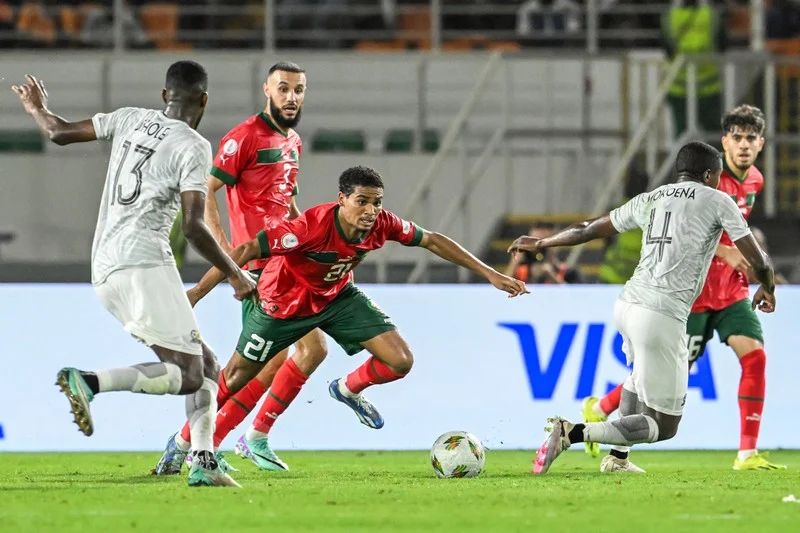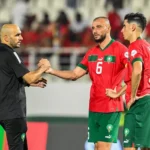The quest of the Moroccan national football team towards their second continental star continues with “The Lions of the Atlas” falling short of clinching the Africa Cup of Nations title in Ivory Coast.
Despite the high expectations following their remarkable performance in the Qatar World Cup, reaching the semi-finals, they disappointed by exiting early in the round of 16.
Entering the tournament with most of the players who shone in the World Cup, defeating European giants Belgium and Spain, holding their ground against 2018 champion France, optimism was high.
Guided by the globally recognized coach Walid El-Rakraki, who gained fame for historic victories, including a friendly win against Brazil, the continental celebration turned into a harsh reality, echoing the struggles that have haunted Morocco for years.
El-Rakraki had warned before the Ivory Coast edition that the journey would be challenging due to harsh weather conditions and the fact that Morocco would be a target for all teams.
This became evident even in the opening match, where, despite a 3-0 victory over Tanzania, Moroccan strikers squandered numerous easy opportunities.
“The Coach Failed, Not the Players”
This was perhaps one of the primary reasons for their premature exit from a tournament that held great hopes for lifting the cup for the first time in 48 years, potentially boosting morale for consecutive victories when they host the next edition in 2025.
The script repeated against the Democratic Republic of Congo, where, despite an early lead, Morocco failed to secure a win, settling for a 1-1 draw, and later securing a narrow 1-0 victory against Tanzania.
The cost was dear in the round of 16 against South Africa, which disrupted their success for the second consecutive time after the World Cup.
South Africa became the first and last team Morocco lost to in the current edition’s qualifiers (2-1).
El-Rakraki summed it up post-match: “I believe we had opportunities to seal the game in the first half and didn’t.
We had a penalty that could have changed the course of the game, but unfortunately, Achraf Hakimi missed it five minutes before the end.”
He added, “At this level of competition, effectiveness in front of the goal is crucial.
We learned a lot from this group. We suffered from many absences and injuries, especially Sofiane Boufal and Hakim Ziyech.
I don’t hide; today’s failure is on the coach, not the players. I take responsibility.”
He continued, “I made mistakes in some choices,” referring to the decision to play Bayern Munich’s defender Nacer Mazraoui, returning from injury.
Mazraoui was one of the weak points for “The Lions of the Atlas” in the match.
Former international midfielder Youssef Chippo highlighted these selection errors, stating in his analysis on “beIN Sports”: “Mazraoui is a great player, but he hasn’t played for over a month, so he wasn’t ready.
It would have been more appropriate to field Yahya Attiyat Allah, who was ready and accustomed to facing South Africa, most of whom represent Sundowns, whom he faced frequently with his club Wydad Casablanca.”
He added, “There is a need to reconsider deploying some players in the lineup.
We should include our young players who won the Africa Cup of Nations under 23 in Morocco to inject new energy and develop the team’s attacking side.”
His colleague at the international channel, former Egyptian player Mohamed Aboutrika, echoed the sentiment, saying: “You have a fantastic team that will dominate in the future; all you need is to support it and support coach El-Rakraki.
The team lacks only a good striker who can convert chances and a different attacking midfielder to complement the roles of Aziz Bouhaddouz and Sofiane Amrabat.”
He continued, “You don’t have the problems of other Arab teams. Egypt has many problems in the system and everything, and Algeria has many problems, and Tunisia too, but Morocco doesn’t.”
“We Will Come Back Strong”
El-Rakraki discussed his future at the helm of “The Lions of the Atlas,” stating after the Qatari World Cup that he would resign if they didn’t reach the semi-finals.
“I cannot decide about my future now after this harsh exit. We will return to Morocco, sit with the president (Fouzi Lekjaa), and see what is best for the team.
I stand by my word as you know me.”
He added, “We have enough time to make the right decision for the team’s benefit.”
El-Rakraki addressed journalists, saying, “The exit is not the end of the world, whether you want it or not.
This happened to many favored teams.
We will come back strongly, although we have been waiting for the title for a long time.
This group includes many young players, and I am sure they will win the title in the future.”
Backup goalkeeper Munir El Mohammedi, one of the few players who spoke to the media after the match, when others maintained silence and visible frustration, said, “It was not written for us to continue our journey to the end and win the title awaited by the Moroccan fans.
We must continue working to lift the cup in the future.”
Captain Romain Saiss commented, “There are axes that need to be developed, and we must work and stop repeating the mistakes of the past if we hope to go far.”











